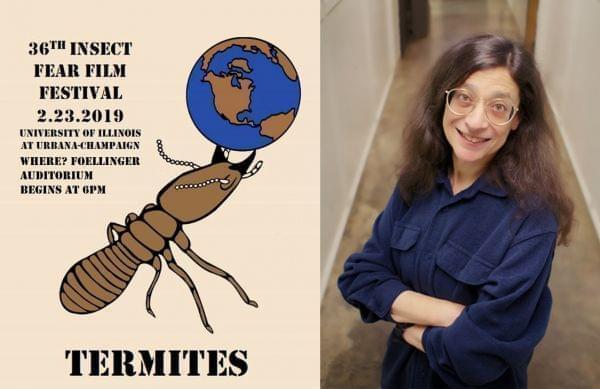36th Annual Insect Fear Film Festival Celebrates Termites

University of Illinois Entomology Department & Alumni Association
Termites will be the focus of celebration this weekend at the 36th Annual Insect Fear Film Festival in Urbana.
The event kicks off at 6 pm on Saturday at Foellinger Auditorium in Urbana. It’s hosted by entomology researchers at the University of Illinois, including department head May Berenbaum.
She spoke with Illinois Public Media about how she hopes the festival will help correct the many misconceptions people have about termites.
What are some common misconceptions about termites?
I'm not sure it's even fair to call them misconceptions or misperceptions, it's more of a lack of knowledge of anything other than the fact that they eat wood.
One challenge with eating insects is they're very small morsels, very little reward for every individual effort. But it's a banquet if you can get into a termite colony."Entomologist May Berenbaum
They do eat wood, and of course they eat structures made by humans out of wood, causing globally billions of dollars worth of damage and create a lot of resentment. But in fairness, there's close to 3,000 species, not all of them eat wood. In fact, so-called lower termites tend to be wood-eaters, but higher termites eat all kinds of things.
There are termites that eat grasses, there are termites that raise their own food. They cultivate particular types of fungi that are found nowhere else in the world except in termite nests, and they eat the fungus, so they're mushroom-eaters.
There are dung feeders--not very glamorous, but it's important in terms of how ecosystems function.
What is the role that termites play in ecosystems around the world?
They're both construction engineers and deconstruction engineers. They build massive structures. Some termite mounds in Africa can be upwards of 30 feet high and house millions of individuals. They're so good at structural engineering that humans have taken the lead from some termite mound design features in order to passively heat and cool buildings. There's some examples in Africa, using the termite construction plan, to figure out how to save energy.
They also break apart things, so they're really important for nutrient turnover in forests. A lot of them are soil diggers, and that's important too for refreshing mineral resources that are locked up underground.
And apparently, throughout the animal world, they're regarded as delicious. So many different animals eat termites, including many human cultures.
One challenge with eating insects is they're very small morsels, very little reward for every individual effort. But it's a banquet if you can get into a termite colony.
Have you ever tasted one?
I'm actually a vegetarian, I've never even eaten an insect. I've been a vegetarian since 1977, so I talk a good game, but...
Can you tell us a little bit about the feature film this year, Alien Apocalypse?
There's a natural curiosity that somehow, during the course of childhood, gets stamped out. We're just trying to keep that little spark alive."Entomologist May Berenbaum
This is a film starring Bruce Campbell as an astronaut physician who has spent many years in cyber sleep, and when he returns with his fellow astronauts to earth, he discovers the planet's been taken over by alien termites who have enslaved humans in order to have them harvest the planet's wood supply because the termites have exhausted their alien wood supply on their home planet.
That movie is rated TV-14 for moderate violence, but we should point out this is a kid-friendly event as well. There will be short films geared toward kids, as well as a live insect petting zoo and exotic insect displays. Why do you feel it's important to get kids interested in insects at a young age?
Well, that's when the prejudices set in. A lot of parents are not very good role models. When we have our petting zoo, our "Meet the Stars" event, the kids, for the most part, are sort of crowding to get to the front of the line to pet a caterpillar or hold a tarantula, which, by the way, are not insects.
And it's their parents that are shrinking back and looking very hesitant about the whole thing. So, I think there's a natural curiosity that somehow, during the course of childhood, gets stamped out. We're just trying to keep that little spark alive.
Follow Christine on Twitter: @CTHerman
Links
- A Preview of the 18th Annual Insect Fear Film Festival
- 21st-Century Segregation; Chaz Ebert On This Year’s Oscars; Insect Fear Film Festival
- ‘Exploding Arthropods’ Highlight This Year’s ‘Insect Fear Film Festival’
- “Mansquito” Headlines Insect Fear Film Festival at U of I
- Don’t be ticked off—come to the Insect Fear Film Festival
- The 30th Annual Insect Fear Film Festival
- The 27th Annual Insect Fear Film Festival
- 2011 Insect Fear Film Festival: Killer Wasps
- The 25th Annual Insect Fear Film Festival
- Forensic Entomology and The 22nd Annual Insect Fear Film Festival

